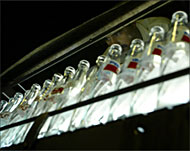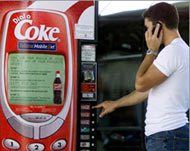Hedge fund to target Coca-Cola
A former equity trader who made his fortune on Wall Street has created a hedge fund to attack The Coca-Cola Company.

American Max Keiser has teamed up with some other “high net worth individuals” to create a boycott-based financial assault on the American multinational that has its headquarters in Atlanta, Georgia.
The hedge fund will attempt to short the share price of The Coca-Cola Company. Shorting, also known as laying or going short, works in the following way:
You phone your broker. The broker will effectively lend you the stock of a company for a given period of time, say six months. You will be required to return the amount of stock you have borrowed on that day. Let us say that you borrow 100 shares at a value of $100.
Vulnerable shares
Then you immediately sell the stock for its current value, which is $100. You then hope that the value falls – that is your bet, or short position.
 |
|
Pepsi and Coca Cola dominate |
So when the six-month period is up, your broker wants his stock back. (Your broker takes a commission whatever happens.) If the value of the stock has fallen to $50, then you buy 100 shares at $50 and give them back to the broker.
Your broker has back his 100 shares but you have made $50 profit as you sold the original stock for $100 and have only had to give back shares worth $50.
Of course, if the stock goes up in value instead of falling, you will lose. Shorting is a very risky financial transaction.
“But our fund is different,” Keiser told Aljazeera.net from London. “We will create a fund based on the amount of people who come and register with us at www.karmabanque.com to boycott the product.
He added: “The more people join our boycott, the more money will be pumped into the fund. The more people join the boycott, the bigger the signal becomes to the financial community to sell their shares.”
Monetised dissent
The trader hopes that boycotts will be a way that communities around the world can show their anger at US foreign policy.
|
“Any community anywhere, in the Middle East or anywhere else, can use this fund to monetise their dissent” Max Keiser, |
“Anyone can participate. All you need to do in this case is boycott Coca-Cola. Any community anywhere, in the Middle East or anywhere else, can use this fund to monetise their dissent. Rather than taking on a whole load of risk themselves, they can use our fund to do it,” Keiser said.
“We have created something called the boycott vulnerability ratio (BVR), which sounds a bit crazy but is in fact very simple. It is the full value of the company, or market capitalisation, divided by their sales. Coca-Cola is simply the most vulnerable at the moment as it is trading at its year low.
Keiser added: “It could have been another company like Exxon-Mobil, as a lot of people would like to attack Exxon. But right now Exxon are not vulnerable to a boycott. Coca-Cola are, that is why we picked them. If you start to subtract sales from Coca-Cola, their share price begins to look very vulnerable.”
‘Anti-monopolist”
This unique strategy is cemented by Keiser’s own desire to use the financial markets to help undermine US superpower status.
 |
|
The Coca-Cola Company stock is |
“We are not anti-capitalist. We are anti-imperialist and anti-monopolist. Coca-Cola has been chosen because the stock is American and it is vulnerable. It is already sucking wind.”
He said: “It is trading near its lows and this is just another signal to ditch it. The world no longer has any faith in the United States to help create a stable global economy. Rather they are fearful of what America might do.”
Keiser says he has not been short of those wealthy people who think the gamble is one that can pay off.
“We have already received a lot of attention from investors. We have set a maximum number of investors at 99. Obviously they have to be high net worth individuals, but we already have enough money to start the fund.”
Bullish on success
The fund has been set up in conjunction with the British environmental magazine The Ecologist, which is also bringing people into the boycott.
 |
|
In India, activists say Coke has |
“As for the profits from the fund, they will be given back to victims of Coca-Cola. When we say victims we mean the people in Colombia who have fallen foul of Coca-Cola’s anti-union activity. Or in India, where Coca-Cola is tapping water supplies away from local farmers.”
So rather than work for a set of private clients, Keiser sees the aim to take profits out of corporations and give them back to ordinary folk around the world.
“There has been a lot of talk recently about the end of the bull market. Well, I don’t think this is the reality of the situation. There is a huge bull market waiting to be tapped and that is the bull market of dissent.”